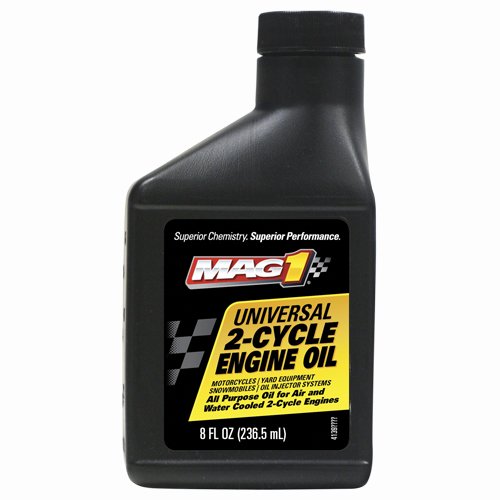Mag 1 60138 Universal 2-Stroke Engine Oil – 8 oz. Bottle Mag 1
$ 2,59 $ 1,55
Motor oil is made from crude oil and is used to lubricate, clean, and cool engines. Types of motor oil include conventional, synthetic, diesel, bio-based, hybrid (blends of conventional and synthetic), and recycled oils. Motor oil varies in weight and viscosity, as well as additives that some manufacturers add to the oil during the refining process. A numerical code system created by the Society of Automotive Engineers (SAE) grades motor oils according to viscosity–the higher the number between 0 and 60, the more viscous (thicker) the oil is. Most consumer motor oils are graded by two numbers, with the first number indicating cold weather (Winter or “W”) performance.
2-Stroke Engine Oil
This oil is specifically designed for 2-stroke (or 2-cycle) engines. 2-stroke engines are typically “total-loss lubrication” engines, meaning that this oil will burn up in the combustion chamber when the engine is on and will need to be replaced regularly. Common uses of 2-stroke oil are some motorcycles, lawnmowers, snowmobiles, marine outboard motors, and other small-engine devices.
Conventional Motor Oil
This oil is a conventional motor oil, meaning it is refined from crude oil or petroleum products. Conventional motor oils may or may not have additives included after refining. Conventional motor oils are more versatile than synthetic or hybrid motor oils, because they are suitable for use with nearly all types of modern vehicle engines, from cars and trucks to motorcycles, ATVs, farm equipment, and more.
| Title | Single, Case of 12 |
|---|
Professional packing and fast shipping
We have a range of shipping options because of our long-term partnership with UPS FedEx DHL. Our warehouse personnel will pack all goods to our exacting requirements. Your items will go through an extensive inspection and be properly packaged prior to being delivered. We ship to thousands customers every day across multiple countries. This is a sign of our dedication to being the largest online retailer globally. Warehouses and distribution centers can be found in Europe and the USA.
Note: Orders that contain more than one item are assigned a processing period depending on the item.
Prior to shipment the items, our staff will carry out an extensive inspection of the products you ordered. The majority of orders are shipped within 48 hours. Expected delivery time is between 3 and 7 days.
Returns
Due to multiple entities which include the factory as well as the warehouse, we cannot completely manage our stock. The actual inventory can fluctuate at any time. Please be aware that it is possible that your order will run out of stock even after you have placed the order.
The period of time is 30 days. However, if the 30 days have elapsed after you bought your product, we are unable to provide a refund or exchange.
Your item must be in its original packaging and in good condition. It must also not be used. It should also be in the original packaging.
Related products
Uncategorized
Household Supplies
Automotive
Garage Gorilla GG-6/32 Garage Gorilla Gas Pump Cleaner, 32 Volts (Pack of 6) Garage Gorilla
Home/Kitchen
Automotive
DuraMAX Synthetic Global ATF (Automatic Transmission Fluid) – Case of 12 Quart Bottles DuraMAX
Household Supplies






































